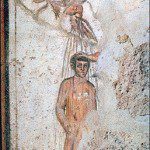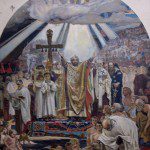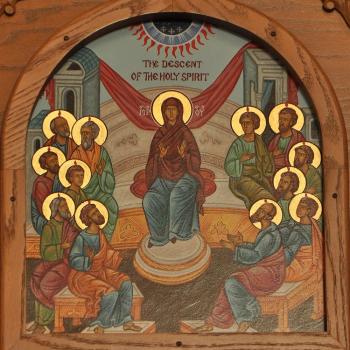For the Fifth Sunday of Pascha, the Byzantine tradition lifts up St. Photina, the Samaritan woman who met Christ at the well, as a representation of what Christ offers us as the fruit of his resurrection: the gift of the Holy Spirit. It was not with a man, but with a woman, and not just any woman, but a Samaritan woman, a woman who was looked down upon by society, even by Jesus’ disciples, who was called by him to share in the gifts of the kingdom of God. We all suffer an existential thirst, and the water of life, the Holy Spirit who flows from the Son, is able to satisfy that thirst, even as Jesus, the bread of life, is able to satisfy our spiritual hunger.
In the way this encounter was recorded, we see that Apostle John was able to show the reordering of creation which would happen as a result of the incarnation itself. Sin disfigured the world, and in that disfigurement, cracks were formed along the great chain of being, where relative distinctions became the basis for hostile division such as race against race, man against woman, and humanity against nature itself. These divisions made for “winners” and “losers,” those who took control and dominated the world and said they were great, and those who suffered abuse at the hands of those who claimed to be great – society reified the effects of sin, and used the order it created to justify injustice itself.
The light of grace seeks to unite everyone in the bond of love so that the effects of sin are overturned, and humanity finds itself united as one. In this fashion, the division between races and sexes are dismantled, represented by the way Paul wrote of the leveling off of those distinctions in Jesus Christ: “There is neither Jew nor Greek, there is neither slave nor free, there is neither male nor female; for you are all one in Christ Jesus” (Gal. 3:28 RSV).
![St. Photina by Schuppi (Own work) [GFDL (http://www.gnu.org/copyleft/fdl.html) or CC BY-SA 3.0 (http://creativecommons.org/licenses/by-sa/3.0)], via Wikimedia Commons](https://wp-media.patheos.com/blogs/sites/637/2017/05/Icon_of_Agia_Fotini-Pachia_Ammos-Lasithi-225x300.jpg)
So he came to a city of Samaria, called Sychar, near the field that Jacob gave to his son Joseph. Jacob’s well was there, and so Jesus, wearied as he was with his journey, sat down beside the well. It was about the sixth hour.
There came a woman of Samaria to draw water. Jesus said to her, “Give me a drink.” For his disciples had gone away into the city to buy food. The Samaritan woman said to him, “How is it that you, a Jew, ask a drink of me, a woman of Samaria?” For Jews have no dealings with Samaritans. Jesus answered her, “If you knew the gift of God, and who it is that is saying to you, `Give me a drink,’ you would have asked him, and he would have given you living water.”
The woman said to him, “Sir, you have nothing to draw with, and the well is deep; where do you get that living water? Are you greater than our father Jacob, who gave us the well, and drank from it himself, and his sons, and his cattle?” Jesus said to her, “Every one who drinks of this water will thirst again, but whoever drinks of the water that I shall give him will never thirst; the water that I shall give him will become in him a spring of water welling up to eternal life” (John 4:5-14 RSV).
The rivalry between the Jews and the Samaritans came from both sides. They ostracized each other. For this reason, it would seem strange that a Jewish man, Jesus, would ask a Samaritan woman for a drink of water. Yet, as seen in this pericope, the social stigma which separated the two was undermined by Jesus, showing that he had come not just for the Jews, though his preaching was first rendered to them, but for all; he was willing to accept what others had to offer him. Likewise, her status as a woman was underscored here; he treated her as someone with dignity and honor of her own. This was particularly clear with the exchange: St Photina was surprised at how Jesus came and showed her honor despite being a Samaritan woman, someone who would be seen as very low in the Jewish understanding of the social hierarchy. It was, however, not only an opportunity for her to interact with Jesus, to help him with his needs, it was also an opportunity for her to receive from him a greater good, the gift of the Spirit, if she had only asked for it. Jesus told her that while he needs her help for his thirst, she needs his for her spiritual thirst, for he had the water of life flowing within him, filled with the Spirit, and if she opened her spiritual eyes and saw who was before her, she would receive a greater gift, a greater glory, than even the social reorientation which she experienced.
St. Photina was quick to pick up the cue, and so indeed asked him, what water he had to offer, from which she is told about what was soon to happen thanks to his work in the world: the social order was going to be changed, and all who come to God will worship God in a transcendent, spiritual form which does not follow mere human religious constructs. This is not to say Jesus denied the religious observance which happened in the temple – or on the mountain which the Samaritans believed was holy. Such worship could serve as a good foundation, but the cultural significance had to be relativized, so that worship of God would not be used to continue along the divide breaking up the great chain of being. The social order and distinctions established by sin would be completely broken down by Jesus, the messiah, so that the separation between various peoples who saw some special, exclusive relationship with God would be overturned as God would be shown to be a God who is over all. God will be able to be worshiped anywhere, in many fashions, and those who try to limit God by one fashion or another, or limit access to him in one place alone, will find the omnipresence of God in the messianic kingdom overrides their attempt to control God as God will be the one in control and the one who will make everywhere a place which can be put to use for his worship.[1]













